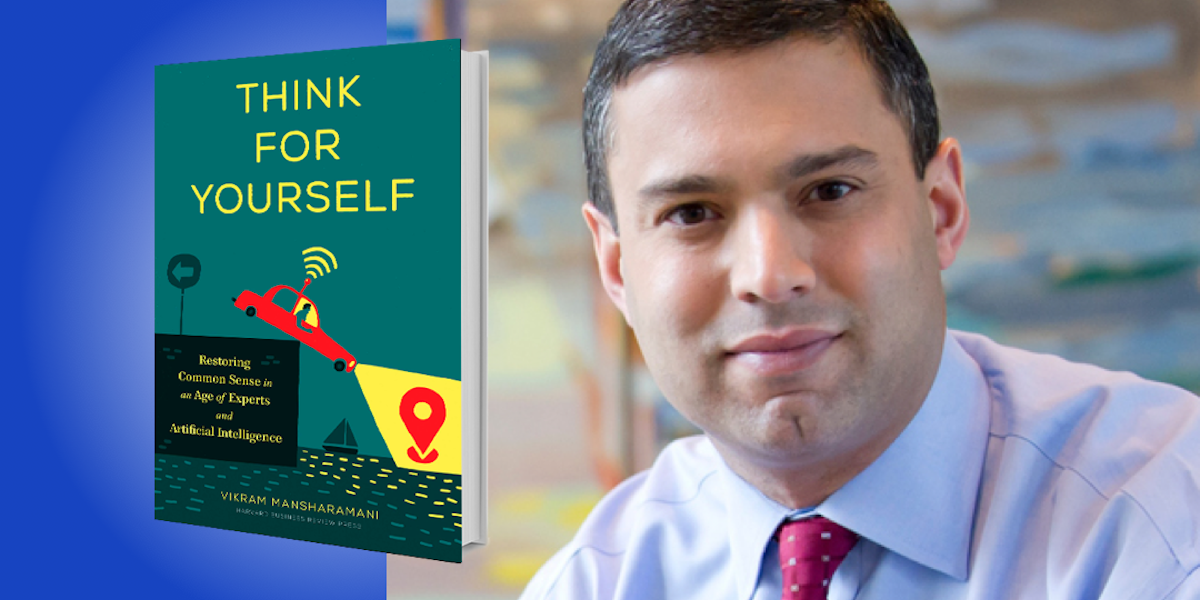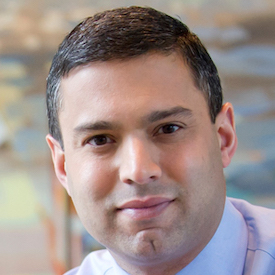Vikram Mansharamani is a Harvard University lecturer whose writings and ideas have appeared in Fortune, Forbes, the New York Times, and more. Mansharamani also advises several Fortune 500 CEOs and their boards on how to navigate uncertainty in today’s dynamic global business and regulatory environment.
Below, Vikram shares 5 key insights from his new book, Think for Yourself: Restoring Common Sense in an Age of Experts and Artificial Intelligence. Download the Next Big Idea App to enjoy more audio “Book Bites,” plus Ideas of the Day, ad-free podcast episodes, and more.
1. We’ve outsourced too much of our thinking.
As a result of the overload of information and explosion in choice that we face in every aspect of our lives, we’ve come to expect that there is a way to optimize all of our decisions. But the possibility of making a suboptimal decision makes us feel anxious, so we run into the arms of experts and technologies that offer solutions. But this outsourcing of thinking has gone too far—it’s now no longer a choice, but rather the default condition. We’ve lost the ability to think through the assumptions being made on our behalf. It’s time to reclaim our autonomy.
2. We must learn to keep experts on tap, not on top.
We have to learn how to extract the value that experts provide without giving up our control or autonomy. In trying to do this, we often find ourselves bouncing like ping pong balls between complete deferral to experts and complete dismissal of them. Instead, I suggest we think of ourselves as artists putting together a mosaic; we need to tap into the people who provide the correct tiles, i.e. the experts. They provide the key inputs, and we use those inputs to form the picture of what we’re trying to do.
3. To better navigate uncertainty, we should triangulate using multiple perspectives.
There’s a famous parable of six blind men who stumble upon an elephant. One of the blind men, feeling a leg of the elephant, determines that he’s found a tree. Another blind man, feeling the trunk, concludes that he’s found a snake. Each perspective is limited and incomplete; it’s only by triangulating through the use of multiple perspectives that they get an appreciation for the whole, i.e. the elephant. It’s often this conflicting information that best guides us toward understanding, which is why we should seek disagreement, not turn away from it.
“The key insight might lie in the shadows.”
4. We must mindfully manage our focus.
Think about trying to find a lost set of keys in a dark parking lot. We turn to an expert to help us find them, and the expert shines a spotlight on one part of the parking lot. That spotlight is where we tend to look exclusively—but do we really know the keys are in that area? By outsourcing that thinking, we’ve given up some autonomy, and we’re ignoring huge swaths of possible insight. So we should ask experts questions about why we should focus on the particular domain or course of action that they are recommending. After all, the key insight might lie in the shadows.
5. Embrace fresh eyes.
When Franck Goddio, a financial and economic consultant, caught wind of an undiscovered city off the coast of Alexandria, Egypt, he decided to try and find it himself. He reviewed ancient texts referencing the city, then started conducting dozens of minor excavations. His early findings nudged him in directions that seasoned archaeologists dismissed as highly unlikely—but in 2000, he discovered the lost city of Thonis-Heracleion. How did a financial consultant succeed where so many archaeologists had failed? Perhaps the professionals’ experience had actually created blind spots, and it was Goddio’s fresh eyes that enabled his amazing find.
For more Book Bites, download the Next Big Idea App today:

































